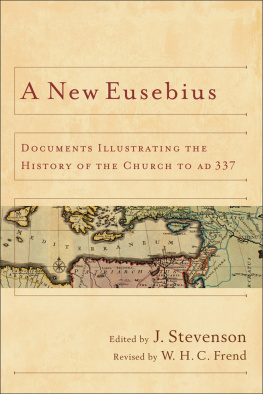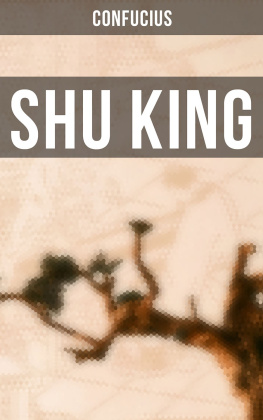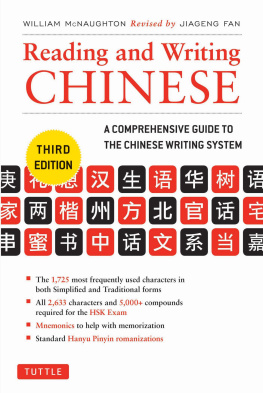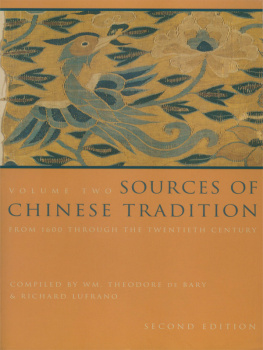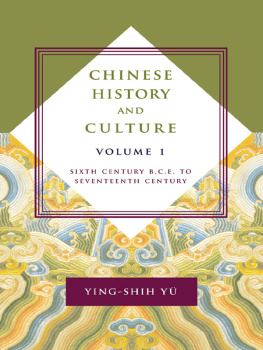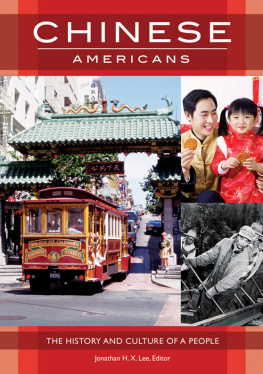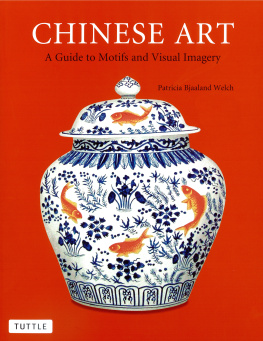Patricia Buckley Ebrey - Chinese Civilization: A Sourcebook, 2nd Ed
Here you can read online Patricia Buckley Ebrey - Chinese Civilization: A Sourcebook, 2nd Ed full text of the book (entire story) in english for free. Download pdf and epub, get meaning, cover and reviews about this ebook. year: 1993, publisher: The Free Press, genre: Art. Description of the work, (preface) as well as reviews are available. Best literature library LitArk.com created for fans of good reading and offers a wide selection of genres:
Romance novel
Science fiction
Adventure
Detective
Science
History
Home and family
Prose
Art
Politics
Computer
Non-fiction
Religion
Business
Children
Humor
Choose a favorite category and find really read worthwhile books. Enjoy immersion in the world of imagination, feel the emotions of the characters or learn something new for yourself, make an fascinating discovery.

- Book:Chinese Civilization: A Sourcebook, 2nd Ed
- Author:
- Publisher:The Free Press
- Genre:
- Year:1993
- Rating:4 / 5
- Favourites:Add to favourites
- Your mark:
- 80
- 1
- 2
- 3
- 4
- 5
Chinese Civilization: A Sourcebook, 2nd Ed: summary, description and annotation
We offer to read an annotation, description, summary or preface (depends on what the author of the book "Chinese Civilization: A Sourcebook, 2nd Ed" wrote himself). If you haven't found the necessary information about the book — write in the comments, we will try to find it.
Chinese Civilization: A Sourcebook, 2nd Ed — read online for free the complete book (whole text) full work
Below is the text of the book, divided by pages. System saving the place of the last page read, allows you to conveniently read the book "Chinese Civilization: A Sourcebook, 2nd Ed" online for free, without having to search again every time where you left off. Put a bookmark, and you can go to the page where you finished reading at any time.
Font size:
Interval:
Bookmark:
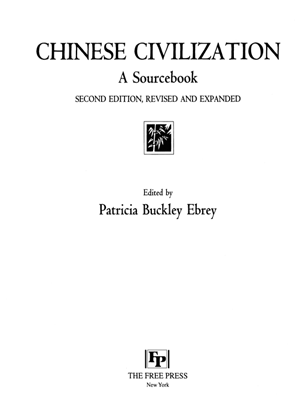
Copyright 1993 by Patricia Buckley Ebrey
Copyright 1981 by The Free Press
All rights reserved. No part of this book may be reproduced or transmitted in any form or by any means, electronic or mechanical, including photocopying, recording, or by any information storage or retrieval system, without permission in writing from the Publisher.
The Free Press
A Division of Simon & Schuster Inc.
1230 Avenue of the Americas
New York, N.Y. 10020
www.SimonandSchuster.com
Printed in the United States of America
printing number
17 19 20 18
Library of Congress Cataloging-in-Publication Data
Chinese civilization: a sourcebook / edited by Patricia Buckley Ebrey.2nd ed., rev. and expanded.
p. cm.
Rev. and expanded ed. of: Chinese civilization and society.
Includes bibliographical references and index.
ISBN 0-02-908752-X
eISBN-13: 978-1-4391-8839-2
1. ChinaCivilizationSources. 2. ChinaHistorySources. I. Ebrey, Patricia Buckley II. Chinese civilization and society.
DS721.C517 1993
951dc20 92-47017
CIP
Over the years I have had the pleasure of meeting and talking with many students and teachers who used Chinese Civilization and Society: A Sourcebook in their classes. Repeatedly they told me that what they liked most about it was its livelinessthe variety in the kinds of sources, the abundance of ones about ordinary life, the sprinkling of humor and glimpses of personal life. For their sakes I have long been thinking I should update it to bring it up to the 1990s and take into account reevaluations of the Mao years.
When I finally found the time to tackle revisions, I decided to do a more thorough rethinking of the overall purposes of this sourcebook and how it actually gets used. My original goal fifteen years ago was to get into print lots of new translations of the sorts of documents that had been neglected in other sourcebooks: popular stories, descriptions of local customs, texts like tenancy contracts, essays that would reveal how relatively ordinary people thought, and so on. There were already many good translations of philosophical and religious texts, of standard historical accounts of great events, and of Chinas relations with foreign peoples, so I did not give these topics as much space as texts about daily life or the mental world of ordinary people. From my conversations with colleagues around the country who have been assigning this book to their students, I have come to realize that few of them assign any other sourcebook or any other original texts. Chinese history is commonly taught in a rapid survey lasting only one or two semesters, with never enough time to read widely in the available translations. The Sourcebook would better meet classroom needs, I now realized, if it gave balanced coverage to all aspects of Chinese civilization, regardless of whether a source had also been translated elsewhere.
Consequently I have made revisions throughout this book. The selection of sources for China since 1949 has been extensively revised and the coverage of the earliest periods expanded. Sometimes I have substituted an earlier piece for a later one on the same subject; for instance, I added a selection from the Tang code in place of one from the Ming code and some fourth-century ghost stories instead of some seventeenth-century ones. I have also expanded coverage of philosophy and religion in general, with new selections on Confucianism, Taoism, Legalism, and Buddhism. In addition, I have added quite a few pieces that relate to political ideas and practices and to Chinas contacts with foreign peoples. Altogether there are thirty-nine new selections, bringing the total to one hundred. To make room for these new pieces, I have had to make cuts, sometimes shortening pieces, sometimes eliminating ones that seemed, on balance, to contribute less to the overall understanding of Chinese civilization. Although the final selection is still rich in sources for social and cultural history, I now believe that it is sufficiently well rounded to serve as the sole sourcebook in a course on Chinese history or civilization. To bring attention to the change in the focus of this book, I decided to change the title as well, to Chinese Civilization: A Sourcebook.
Several people have helped me prepare this new edition. My colleagues Kai-wing Chow, Peter Gregory, and Kenneth Klinker offered advice on new selections. Chiu-yueh Lai did the conversions from Wade-Giles to pinyin romanization. She and Chunyu Wang each translated one of the new pieces. Susan Harum helped with the final preparation of the manuscript. Two scholars at other universities generously provided translations in areas of their expertise, David Keightley of the University of California at Berkeley and Ruth Dunnell of Kenyon College. The remainder of the new translations I did myself.
P.B.E.
September 1992
This sourcebook came into being because of my belief that listening to what the Chinese themselves have had to say is the best way to learn about China. In teaching Chinese history and culture, however, I found that available translations were of limited use for the kinds of questions students were asking: How different were ordinary Chinese from ordinary Westerners? Did their different religions or philosophies lead to major differences in daily life? Did the Chinese have the same kinds of personal, social, and political problems as we do, or different ones? To help students find answers to these questions, I had to search for sources that could tell us more about the lives, outlooks, and habits of the full range of the Chinese population, not merely philosophers and scholars, but also women, peasants, townsmen, and undistinguished local officials. Since such people seldom wrote essays or autobiographies, I had to look for different kinds of sourcesfolk songs, plays, moral primers, descriptions, contracts, newspaper articles, and so on.
My efforts to make a sourcebook out of this material could never have succeeded without the generous help of others. Acknowledgment for funding must be made to the National Endowment for the Humanities for an Education Project Grant. This grant allowed me to employ several graduate-student research assistants. Jane Chen, Lucie Clark, Mark Coyle, Nancy Gibbs, Lily Hwa, Jeh-hang Lai, Barbara Matthies, and Clara Yu helped prepare, correct, and polish the translations in this book. Although all the translations we did are attributed to specific translators, they are in fact joint efforts, since in all cases either I as editor or one of the assistants extensively revised the translation to improve accuracy or style. Clara Yus contribution to this book deserves particular note; she worked with me from the inception of the project to its completion and is responsible for thirty of the eighty-nine selections.
Over the past five years, I have also regularly profited from the advice and criticisms of colleagues. Robert Crawford and Howard Wechsler helped test the translations in courses at the University of Illinois. Several other faculty members at Illinois have been ready to answer my questions on subjects about which they knew more than I, including Richard Chang, Lloyd Eastman, James Hart, Richard Kraus, Whalen Lai, and William MacDonald. I have also benefited greatly from the reactions and suggestions of professors at other colleges who saw earlier versions of this sourcebook in whole or part. These include Suzanne Barnett (University of Puget Sound), David Buck (University of Wisconsin-Milwaukee), Parks Coble (University of Nebraska), Wolfram Eber-hard (University of California, Berkeley), Edward Farmer (University of Minnesota), Charlotte Furth (California State University at Long Beach), Peter Golas (University of Denver), John Langlois (Bowdoin College), Susan Mann Jones (University of Chicago), Susan Naquin (University of Pennsylvania), John Meskill (Barnard College), Keith Schoppa (Valparaiso University), Jonathan Spence (Yale University), Philip West (Indiana University), and Arthur Wolf (Stanford University).
Next pageFont size:
Interval:
Bookmark:
Similar books «Chinese Civilization: A Sourcebook, 2nd Ed»
Look at similar books to Chinese Civilization: A Sourcebook, 2nd Ed. We have selected literature similar in name and meaning in the hope of providing readers with more options to find new, interesting, not yet read works.
Discussion, reviews of the book Chinese Civilization: A Sourcebook, 2nd Ed and just readers' own opinions. Leave your comments, write what you think about the work, its meaning or the main characters. Specify what exactly you liked and what you didn't like, and why you think so.

